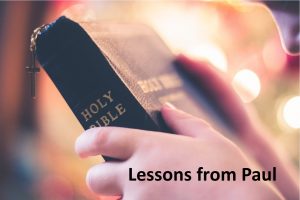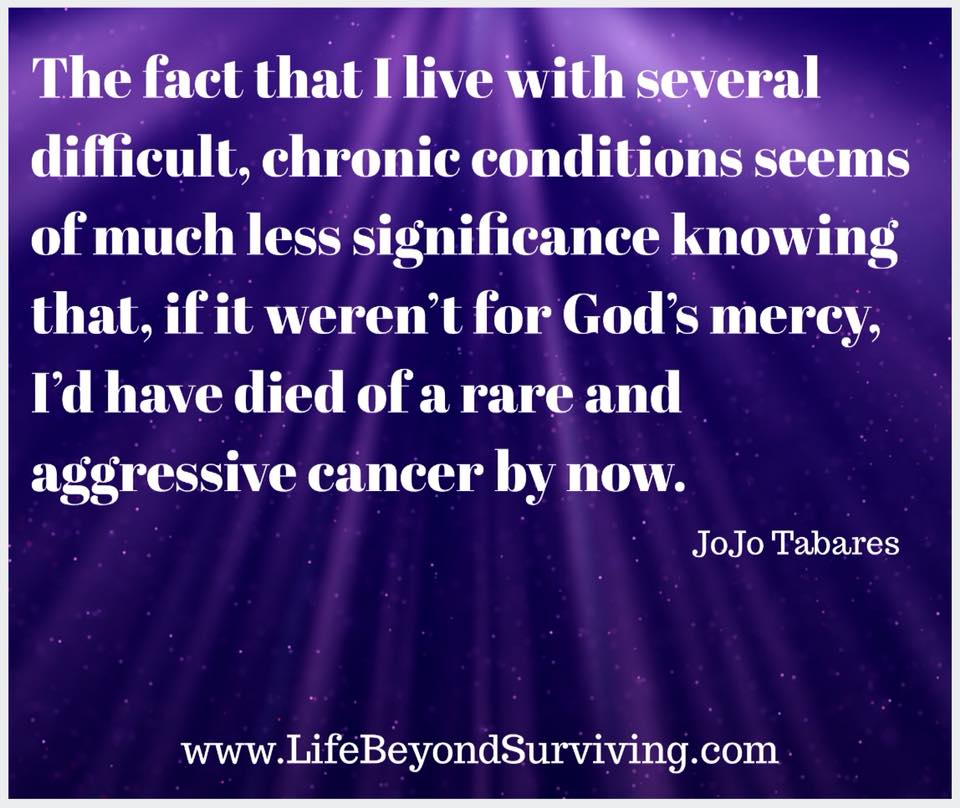 So last week we looked at the lessons we can learn from Job about being in trial. This week, I’m sharing the lessons I feel we can learn from Paul.
So last week we looked at the lessons we can learn from Job about being in trial. This week, I’m sharing the lessons I feel we can learn from Paul.
1. Bad things happen even when you’re doing God’s will:
I heard some say that bad things happen to those who are doing evil, but this is a fallen world, so bad things can happen to anyone. The Bible talks about how the you can be persecuted for your faith. Paul was one who was. He was put in jail at least twice. But Paul also talked of having some kind of medical problem he called a thorn in his side that he prayed would be removed. God didn’t heal Paul, but instead said, “My grace is sufficient for you.” Bad things happen even when we are doing God’s will for our lives. Bad things also happen in the secular world even when we follow the rules. Once my dh was fired even though he was doing a fabulous job for the owner of the company. The owner just didn’t like that my dh was Mexican. It caused our family severe financial hardship for a few years and we are not totally out of the woods yet, though God has always made a way for us and things are looking up financially.
2. There is always purpose to your life:
Paul had a purpose to (a calling on) his life that kept him busy even though he struggled with various trials. I believe each one of us also has a purpose to or a calling on our lives. And that purpose can get us through the struggles if our focus is on that purpose more than it is on our struggles. Hard to do at times, but well worth it.
3. God sets NO limits on some of our trials:
Job’s trails were allowed to continue for a limited time. Some of our trials may be more like Paul’s that last until the Lord calls us home. I’ve had some of my chronic illnesses since I was a teen. Others have been added unto me in my 20s, 30s, 40s, and 50s and I don’t expect they will leave me this side of heaven. Like Paul, I’ve had to deal with them for decades. You may have had to deal with your trial(s) for a lifetime. God does’t promise He will always heal, but He does promise to be there with us to see us through.
4. Paul shows us three qualities that are good to develop in life:
Paul was patient, persistent, and courageous. Those are three things that we would do well to develop because they are the three qualities I have found that help you get through a trial. Struggles are so much more difficult when we are not patient to wait on the Lord’s timing.
We can often feel as if we should be healed or this crisis should have been over sooner, but the Lord may want to use the struggle we are in for a greater good. If we are patient, we don’t fight against what is happening, but rather go with the flow and thus have less inner struggle to deal with while in trial.
Trials can often overwhelm us to the point where want to give up, but Paul shows us that persistence pays off in the end. We can do so much more if we keep going, keep doing what we can and know to be right. Not that we won’t have thoughts of giving up, but that they will be momentary and allow us to keep moving forward.
Courage is what it takes to get through trials and struggles and Paul is a great example for us to follow-especially if those trials are long lived.
5. Paul was focused on God’s calling in his life.
Paul spent most of his time and energy on his calling. He was laser focused on evangelism and ministry. I believe this is THE most important thing we can learn from Paul about trials. The more you struggle, the easier it is to be distracted from our purpose or calling. That’s how Satan works. He distracts us from doing God’s will by throwing a monkey wrench into our plans. One of those wrenches might have chronic illness on it and another might have financial troubles or neighbor problems… The more laser focused we can be on our mission, the less focused we are on our problems and the smaller they will seem.
6. How to be content in any situation
In Philippians 4:11-13, Paul writes, “I am not saying this because I am in need, for I have learned to be content whatever the circumstances. I know what it is to be in need, and I know what it is to have plenty. I have learned the secret of being content in an and every situation, whether well fed or hungry, whether living in plenty or in want. I can do all things through him who gives me strength.”
Paul’s contentment seems to come from strength he found in God. His patience, persistence, and courage came from having faith and relying on the Lord for everything. He had faith that God knew what was best and that His timing was perfect. That acceptance, I believe, allowed Paul not to fight against his circumstances and just plow through the tasks he was charged with.
7. Paul was eternity focused not self focused
Finally, I believe that Paul’s contentment and joy in the Lord despite trials was easier because he was focused on the bigger picture. If you’ve ever had a baby, especially without benefit of pain meds, you know that probably the only reason you were able to get through that as well as you did was because you were focused on the precious child you were about to be blessed with. Pain of that caliber is too great to endure without meds without some goal in mind.
Paul was focused on eternity with Jesus much more than on the issues he faced day to day. In my own experience, I find that I can get through the irritating, frustrating, painful, and tiring overwhelm much better if I keep my eye on the prize: the mission He gave me, eternity in heaven.








 So several of you asked for an update and here it is.
So several of you asked for an update and here it is.
 So last week we looked at the lessons we can learn from Job about being in trial. This week, I’m sharing the lessons I feel we can learn from Paul.
So last week we looked at the lessons we can learn from Job about being in trial. This week, I’m sharing the lessons I feel we can learn from Paul.